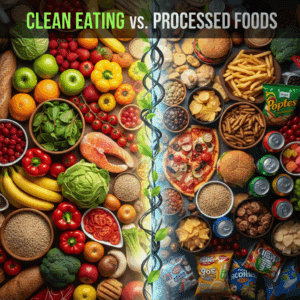Understanding Metabolism and Energy Conversion
Metabolism encompasses the chemical processes that convert food into energy essential for bodily functions. This conversion supports everything from cellular repair to physical activity.
By understanding how metabolism works, we can better appreciate how certain foods influence energy production and promote overall health. Metabolic rate affects calorie burn and vitality throughout the day.
Definition and Role of Metabolism
Metabolism refers to all biochemical reactions that sustain life by converting nutrients into usable energy. It governs how efficiently the body burns calories and manages energy stores.
Its role extends beyond energy production to repair tissues, regulate hormones, and maintain vital processes. An efficient metabolism supports weight management and overall well-being.
Factors such as age, genetics, and diet affect metabolic rate, influencing how the body responds to food and physical demands.
How Food Influences Metabolic Processes
Foods impact metabolism by altering how much energy the body expends during digestion and nutrient absorption, known as the thermic effect of food.
Protein-rich foods demand more energy to process, increasing calorie burn post-meal. Similarly, spices and bioactive compounds in tea and coffee can stimulate metabolic activity.
A balanced intake of specific foods not only fuels metabolism but also supports healthy energy levels, aiding in weight control and vitality.
Key Foods That Accelerate Metabolism
Certain foods can naturally enhance metabolism by increasing the body’s energy expenditure and promoting fat burning. Incorporating these foods helps maintain higher calorie burn throughout the day.
From lean proteins to spicy ingredients, these foods stimulate metabolic processes and support sustained energy, which is crucial for weight management and overall health.
Lean Proteins and Their Thermic Effect
Lean proteins such as chicken breast, fish, eggs, and Greek yogurt have a high thermic effect, meaning the body uses more energy to digest them compared to fats or carbs.
This increased energy expenditure during digestion helps boost metabolism, contributing to greater calorie burning and improving satiety after meals.
Including lean protein regularly not only supports muscle maintenance but also raises the metabolic rate, essential for effective weight control.
Legumes and Fiber for Metabolic Balance
Legumes like lentils, beans, and chickpeas provide plant-based protein along with high fiber content, which prolongs fullness and stabilizes blood sugar levels.
Fiber-rich foods improve digestive health and slow nutrient absorption, which supports a balanced metabolism and prevents rapid energy spikes and crashes.
The combination of protein and fiber in legumes enhances metabolic efficiency, promotes fat loss, and contributes to sustained energy throughout the day.
Thermogenic Spices and Their Impact
Spices such as red pepper, ginger, and cayenne stimulate the body’s thermogenesis, increasing heat production and energy expenditure after consumption.
Capsaicin, found in chili peppers, accelerates metabolism and can also reduce appetite, helping to decrease calorie intake naturally.
Adding these thermogenic spices regularly can aid weight management by boosting calorie burn and enhancing metabolic processes effectively.
Interesting Fact About Capsaicin
Studies show that capsaicin can increase metabolic rate by up to 5%, making it a powerful natural aid for improving metabolism and supporting fat loss.
Green Tea and Coffee as Metabolic Boosters
Green tea contains catechins and caffeine, both of which have been shown to elevate metabolism and promote fat oxidation.
Coffee’s caffeine content also stimulates the central nervous system, increasing metabolic rate and enhancing energy levels temporarily.
Regular consumption of these beverages, in moderation, supports sustained metabolic activity and assists in managing body weight effectively.
Nutrient-Rich Foods Supporting Metabolic Efficiency
Nutrient-rich foods provide essential vitamins and minerals that optimize metabolic functions, enhancing the body’s ability to convert food into energy efficiently.
Consuming these foods regularly supports not only metabolism but also overall health, promoting sustained energy and improved physiological processes.
Whole Grains and Sustained Energy
Whole grains like oats, brown rice, and quinoa offer complex carbohydrates that digest slowly, providing a steady release of energy throughout the day.
This slow digestion requires more metabolic effort and helps maintain balanced blood sugar levels, preventing energy crashes and hunger spikes.
The fiber content in whole grains also supports gut health, which is linked to improved metabolic regulation and nutrient absorption.
Omega-3 Rich Fish and Muscle Development
Fish rich in omega-3 fatty acids such as salmon, sardines, and tuna promote muscle growth and enhance fat metabolism, both important for an efficient metabolism.
Omega-3s reduce inflammation and improve insulin sensitivity, aiding in better energy utilization and metabolic balance in the body.
Including these fish in the diet helps build lean muscle, which elevates resting metabolic rate and supports long-term weight management.
Leafy Greens and Micronutrient Contribution
Leafy green vegetables like spinach, kale, and broccoli provide vital micronutrients, including iron, vitamin C, and antioxidants that support metabolic energy production.
These nutrients assist in oxygen transport and bolster enzymatic functions involved in cellular metabolism, promoting higher energy levels.
Regular consumption of leafy greens also supports detoxification processes, improving overall metabolic health and reducing fatigue.
Practical Tips for Metabolism-Enhancing Diet
Incorporating metabolism-boosting foods daily supports a more active metabolism and improves overall energy levels throughout the day.
Adopting a balanced lifestyle that combines nutritious eating with healthy habits is essential for maintaining metabolic efficiency and wellbeing.
Daily Inclusion and Balanced Lifestyle
To enhance metabolism, include a variety of lean proteins, whole grains, and thermogenic spices in your daily diet for consistent metabolic stimulation.
Balanced meals and regular hydration contribute to supporting digestion, nutrient absorption, and energy production throughout the day.
A diet rich in metabolism-boosting foods should be paired with sufficient sleep and stress management to optimize overall metabolic health.
Limitations and Importance of Physical Activity
While foods can stimulate metabolism, they alone cannot guarantee weight loss without incorporating regular physical activity to increase calorie expenditure.
Exercise boosts muscle mass, which raises basal metabolic rate, making physical activity indispensable for sustaining metabolic health.
Combining diet with aerobic and strength training exercises helps maximize metabolism-enhancing effects and supports long-term health goals.






